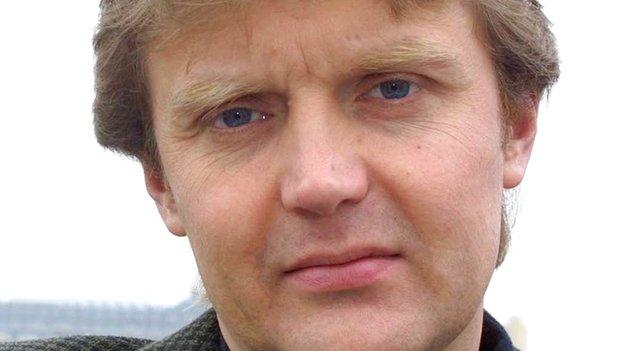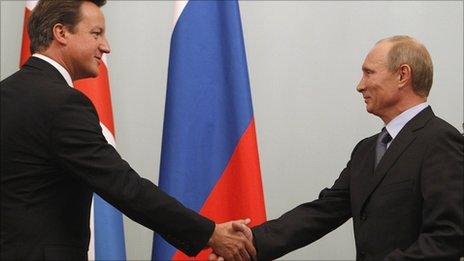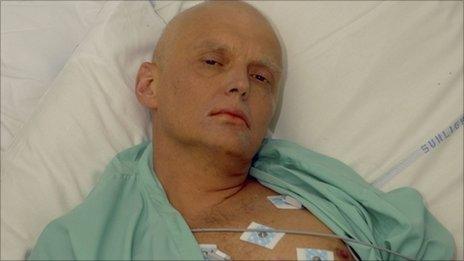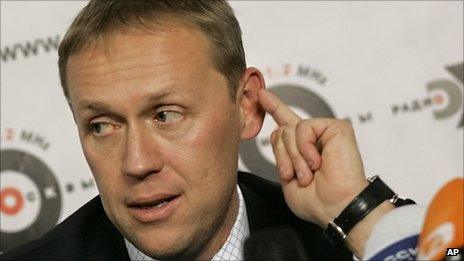Alexander Litvinenko's widow hopes inquest will reveal truth
- Published
Marina Litvinenko: "I would like to know who killed him and why"
The widow of former Russian spy Alexander Litvinenko has told the BBC she hopes an inquest will find the truth about what happened to him.
Mr Litvinenko, 43, is thought to have been poisoned with polonium-210 after having tea with two Russians at a central London hotel in November 2006.
A full inquest will be held next year but a pre-inquest review is being held later to decide the parameters.
The prime suspect, Andrei Lugovoi, has since been elected as a Russian MP.
Marina Litvinenko said: "I would like to know who killed him and why. I said this six years ago and I hope I will know this finally."
The death of Mr Litvinenko, a former Russian security officer who had obtained asylum in Britain, led to a major diplomatic incident as the Kremlin was accused of masterminding his murder.

Analysis
By Gordon Corera, BBC security correspondent
An inquest into Alexander Litvinenko's death was opened just weeks after he died but then immediately adjourned while a police investigation got under way.
That investigation led to the Crown Prosecution Service announcing it wanted Andrei Lugovoi extradited to stand trial.
But nearly six years after Mr Litvinenko's death and with no sign of a trial, Mr Litvinenko's family and friends have lost patience and pushed to re-open the inquest to try to provide some answers.
A key question is how broadly the inquest will range.
If it tries to answer not just how he died but why, and look at issues of where the radioactive polonium might have come from, then it may well lead to renewed diplomatic tensions with Moscow.
Relations had only just recovered from the original investigation in the wake of which both sides had expelled diplomats.

British prosecutors named Mr Lugovoi as the main suspect but he was later elected as a Russian MP and Moscow refused to send him to the UK for questioning. He has denied involvement.
Prime Minister David Cameron raised the issue with Russian President Vladimir Putin recently during his visit to London.
Earlier this year the then Justice Secretary, Ken Clarke, wrote to the then coroner asking for clarification about the estimated £4m costs of the inquest.
Subsequently High Court Judge Sir Robert Owen was appointed an assistant deputy coroner and he will be in charge of pre-inquest review and the inquest next year.
'Difficult to live'
Mrs Litvinenko, who is expected to attend the hearing with her 18-year-old son, Anatoly, says it is very important to have an inquest into her husband's death.
She said she did not think there was a prospect of Mr Lugovoi facing a trial in Britain and the inquest was the best chance of her finding out the truth.
Mrs Litvinenko told the BBC: "It is very important to finalise what happened six years ago in London."
She said: "It is so difficult to live all this life without this truth and without this information. It's difficult for me, and our son, and for our friends."
Mrs Litvinenko said she believed the Russian state was responsible for her husband's death and added: "The polonium that was used... you can't buy or find anywhere because it's all under state control, and Lugovoi was protected. From nobody he became a member of parliament. Why? For what reason?"
Thursday's hearing is expected to decide:
How many witnesses there will be and who will be considered "interested persons"
How to disclose the details of Scotland Yard's investigation
Whether the proceedings will take place in English, with possible Russian translation
Arrangements for a website for the inquest, which might be similar to the Azelle Rodney Inquiry website., external
- Published21 January 2016

- Published12 September 2011

- Published8 September 2011

- Published8 September 2011
